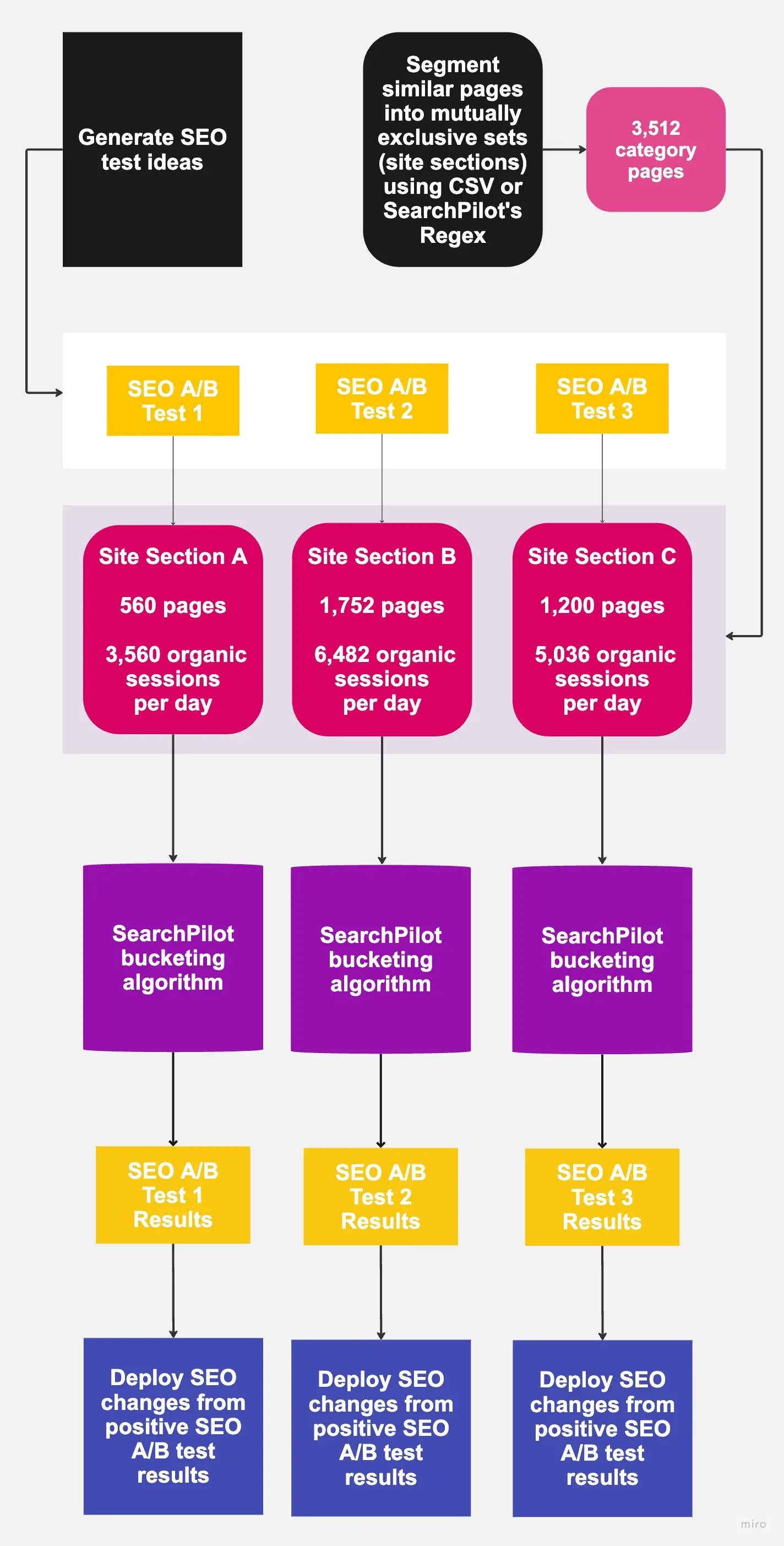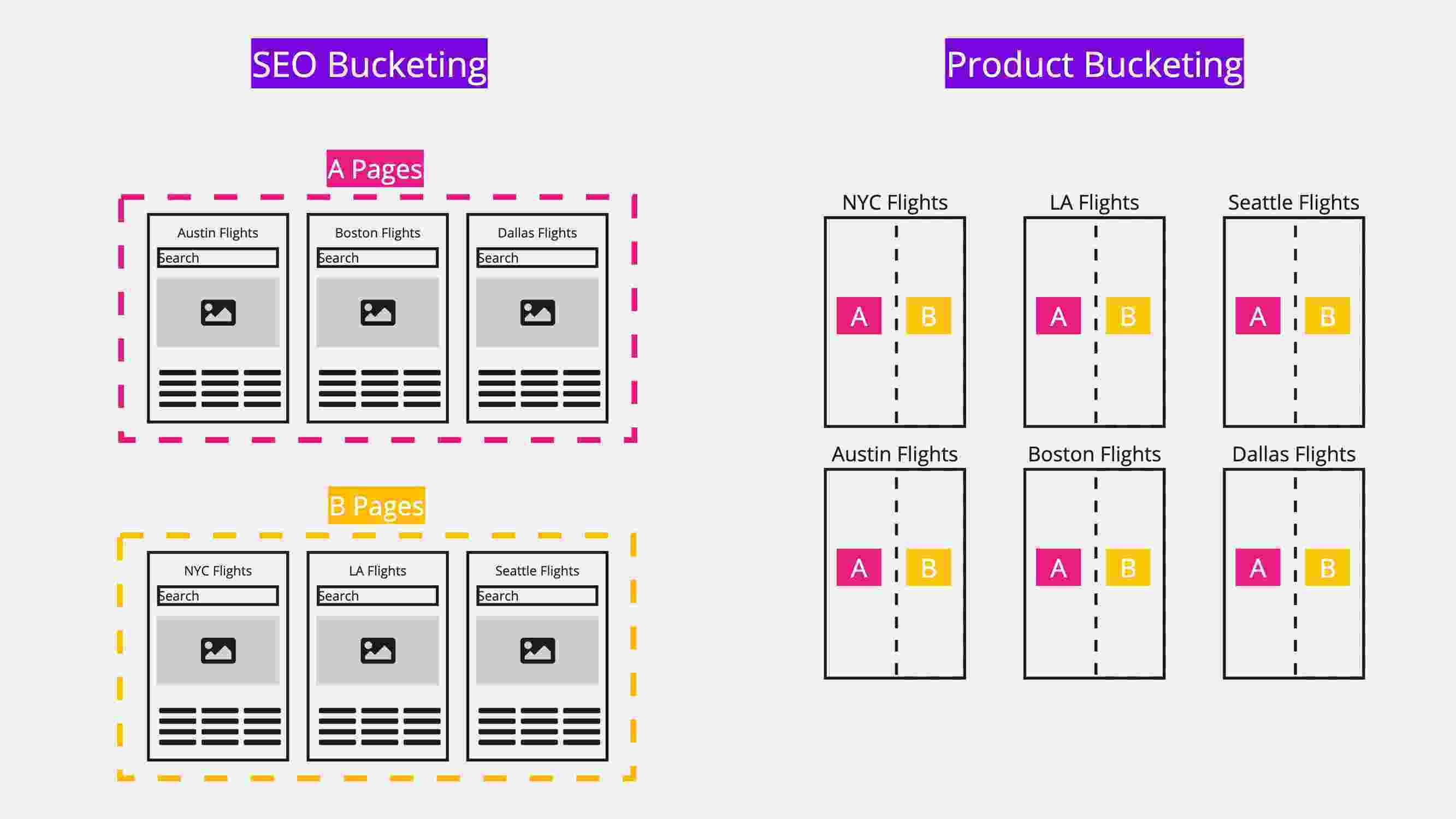The SearchPilot platform allows websites that have hundreds or thousands of pages to run more than one SEO A/B test per page type at one time. This means large websites can now increase their testing cadence to achieve a higher ROI. For example, a large ecommerce site could partition its product pages (PDPs) to enable multiple product page SEO A/B tests at once. By being able to run different types of SEO A/B tests on the same page type at the same time, businesses can quickly identify the types of SEO changes that can drive their organic growth goals.
Built for websites with tons of pages in large site sections
We’ve built this core functionality in the SearchPilot SEO A/B testing platform for large websites in spaces like ecommerce, travel and listings that have thousands, or hundreds of thousands, or even millions of pages on the same page template. This feature is perfect, for example, when you have different product teams wanting to test different ideas for their product groups.
Currently, SEO teams may be following these steps:
- Identify what pages are contained within the page type.
- Export a page list from your analytics platform or similar system.
- Find out how much monthly traffic is associated with each page.
- Assign pages to different groups so that you end up with groups that will look relatively similar in traffic level.
All of this is likely done using different platforms and tools to come up with a set of pages from the same template that you want to run the SEO A/B tests on. This level of complex and manual setup limits your time and resources to only being able to run one SEO A/B test at a time for a page type. This process could also potentially be exposed to errors due to the multiple tools being used. These can all lead to a drag to your SEO testing progress and hinder your team from achieving your SEO goals.
How does the SearchPilot platform help you run more than one SEO A/B test at once on a single page type?
SearchPilot’s platform can help you organize your pages so that you can more reliably test different concepts simultaneously on different groups of pages within a single page type. The app allows you to segment groups of the same page type into distinct test sections that we call ‘site sections’. SearchPilot’s neural network algorithm then automatically buckets the pages into well-balanced control and variant groups, applies the test to variants, and then analyzes the results using a sophisticated methodology.
This powerful feature has been designed for SEO teams handling really large websites that have thousands of pages per template type, to be able to run more than one SEO A/B test per template type at a time. Users can set up each ‘site section’ to have 100+ pages with an aggregate of at least 1,000 organic sessions per day. The more traffic per set of pages in the ‘site section’, the more sensitive the resulting model will be in detecting uplifts, and the less susceptible it will be to outliers skewing the model. See how this works in the diagram below:

What are the benefits of being able to run multiple SEO tests on one single page type using SearchPilot?
There are a number of advantages for running tests in parallel using an advanced SEO A/B testing tool like SearchPilot.
- You are able to run more SEO A/B tests faster.
- You can get to your ROI faster by avoiding negative or inconclusive changes earlier and deploying positive changes immediately using SearchPilot’s meta-cms feature or submitting dev tickets with proven impact numbers.
- You can meet competing product goals simultaneously by segmenting the pages into a site section per product team.
- You are able to see the impact of the proposed website change at a site section level and only roll out the changes that apply to specific site sections if you wish, or you can deploy winners at scale to all the pages in the same template.
- Each ‘site section’ that is created as an outcome of your segmentation process becomes mutually exclusive so the test results from each don’t overlap thus giving you more confidence in the data.
Ready to see a live demo of the platform and how this feature can help you bring more organic traffic to your site? Get in touch.



![[Webinar Replay] What digital retail marketers should DO about AI right now](https://www.searchpilot.com/hubfs/what-to-do-about-ai-thumbnail.png)